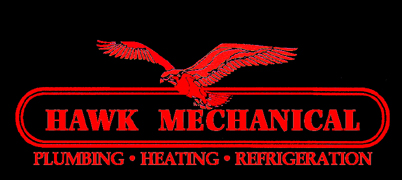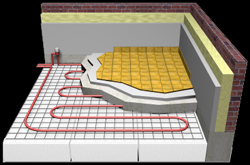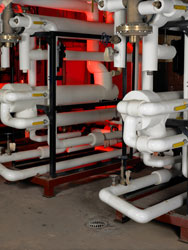1132 Paseo del Pueblo Sur Tel. (575) 758-4433
Fax. (575) 758-3366 New Mexico License #033693
|
||||

HYDRONICS
Residential & Commercial -Hydronic Heating Vs
Gas Forced Air Heating
One of the biggest questions for homeowners considering hydronic heating systems is how they compare to traditional gas forced air heat. Below you will find a list of the important factors to consider when deciding on a heating system.Comfort
Providing consistent comfort by way of reliable heating and warmth is the most important task for your radiant or forced air system.• Forced Air - A benefit to forced air is that it has the ability to quickly raisetemperatures, whereas hydronic heating can be slow with temperature changes due to the use of thermal mass.
• Hydronic - Radiant heating heats the entire room evenly, while keeping tile floor warm to walk upon, and not drying out the air. In addition, forced air can be loud when the heat turns on and off, while hydronic heat works silently in the background.Health
Health concerns for those who are highly allergic or suffer asthma problems should be considered when picking your heat source.• Forced Air – The traditional system has been around for a long time, and modern additions to the system allow for air purifiers and humidifiers, as well as better filters for microscopic organisms pushed through the air.
• Hydronic - Can be a boon to family members with strong allergies or asthma. The radiant heat does not require gusts of forced air to spread heat, so it avoids kicking up dust and allergens within the home. In addition, the air ducts used by traditional systems can be home to other germs and allergens plus lint and dust build up in the system. Filters, specialized cleaning systems, and professional duct cleaners can help improve upon this issue, but radiant heat does not cause any of these problems.Efficiency
Energy efficiency is a concern for anyone who is spending their money on high energy bills each month.• Forced Air – Since this method of heating has been around so long, there are many furnaces to choose from in all levels of efficiency, as well as best construction practices to make the most of the heat. Unfortunately, air ducts in conventional forced air systems are notoriously hard to seal completely. This means that a good deal of heat is lost before it reaches its destination point.
• Hydronic – Radiant heating has no air ducts, but instead a closed loop system that creates very little heat loss while moving the heated water to its destination. In addition, hydronic heat requires very little electricity to run. This combined with its efficiency is why it has become popular for homes built off traditional power grids and in areas that have high electric fees.Types of Radiant Heating Systems
Heating designs for a radiant system can be tailored to most residential needs, whether it is a new custom home, or a remodel in a historic area. The flexibility of this type of advanced home heating system, as well as the high levels of energy efficiency, have made radiant heat an increasingly popular choice for contractors and families alike.Basic Equipment
Every residential hydronic heating design will require the following basic elements to heat the home:• Boiler – The means to heat the liquid.
• Liquid Medium – Traditionally, this has been water, but some systems allow for other liquids or water and antifreeze mixes.
• Manifold/Thermostat – Connected to the thermostat, the plumbing manifold is the hub for directing water flow and room temperatures.
• Tubing – PEX or some other form of plastic tubing is pretty much universal with all hydronic systems, with very little in the way of copper or other rigid piping used.
• Heat Exchanger – The radiator, baseboard heater, or in floor element that transfers the heat into the home.
• Pump – To keep the heated liquid in circulation, so that the warmth is constantly replenished.
There are many different options within each element depending on the type of hydronic radiant system you want for your home.Boiler Options
The cornerstone of any hydronic system is an
energy efficient boiler that heats the liquid with little to no heat loss or wasted energy. In addition to the standard boiler for radiant heating systems, there are a few different boiler options, as well as components that work in tandem with your boiler.• Tankless Hydronic Water Heaters – Much smaller than the traditional tankless water heater, these heaters are specifically designed to allow on demand, energy efficient hot water for radiant heat.
• Combined Hot Water and Heating Systems Boiler – Originally more common in commercial building applications, combined boilers that allow for hydronic heating and home hot water usage are starting to appear for residential use. These can be designed for water tanks and tankless water heating alike.
• Solar Water Heater – A solar heater will not provide enough heated water by itself, but it can increase the energy efficiency of the system and work in tandem with your boiler. A panel on the roof heats a liquid that runs through tubes inside a water storage tank. This creates water that is naturally pre-heated and requires less energy from the boiler to bring to the right temperature.
• Geothermal Heat Pump – Similar to the solar heater above, geothermal heat pumps can preheat the water by using the natural warmth found several feet below the soil. This reduces the amount of natural gas, electricity, or oil that your boiler will need to heat the water.Liquid Options
Traditionally, hydronic heat consists of hot water as the method of transferring heat, and while this is still the norm, modern radiant systems can also incorporate other liquids to heat the home. Glycol is a common antifreeze that is added to a closed loop system. This can help to protect the water from freezing if the piping runs through an exposed area, as well as increase the waters boiling point.
The need for antifreeze or other liquids other than water will be explained by your installer and designed around your specific heating needs.Heating Exchangers and Their Locations
• Underfloor Radiant Loops – Radiant flooring has become very popular for new home construction, as it is much easier to add into the concrete or floor joist system during the original building of the home. It can provide consistent comfortable heating evenly throughout the home.
• Baseboard Heaters/Radiators – Hydronic baseboard units and radiators can be much easier to install for home remodels because they require less tubing below the floor. They can be inconspicuously located along the walls of a room, but you should make sure they are not blocked by furniture, so that the heat can radiate out into the room.
We also offer emergency services at no extra cost.
Emergency #: 575-779-5801
We accept the following credit cards:
Payment plans also available to qualified customers through:
For Special Offers, Info & Coupons just click below to join our mailing list.





